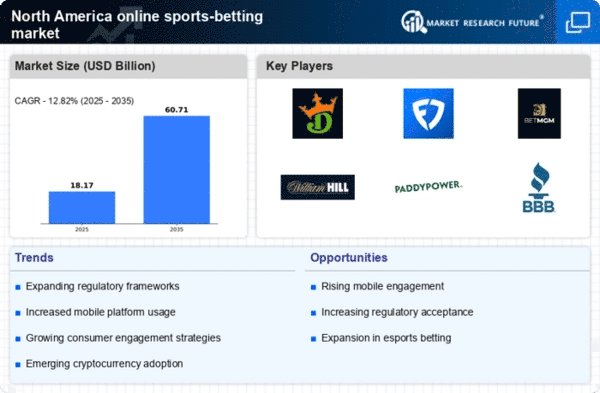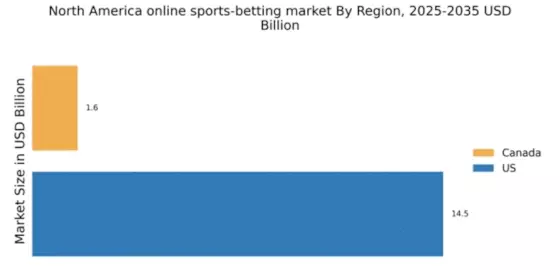Enhanced User Experience
The online sports-betting market is experiencing a transformation driven by advancements in user experience. Betting platforms are increasingly focusing on user-friendly interfaces, mobile compatibility, and personalized features. As of 2025, data indicates that over 60% of users prefer mobile betting applications, which has prompted operators to invest in technology that enhances engagement. Features such as live betting, in-play options, and real-time statistics are becoming standard, making the betting experience more interactive and appealing. This emphasis on user experience is likely to attract new customers and retain existing ones, thereby contributing to the overall growth of the online sports-betting market.
Increased Legalization Efforts
The ongoing trend of legalization across various states in North America appears to be a primary driver for the online sports-betting market. As more states enact legislation to permit online betting, the market is likely to expand significantly. For instance, as of 2025, approximately 30 states have legalized some form of sports betting, contributing to a projected market value of $8 billion by 2026. This shift not only enhances accessibility for consumers but also generates substantial tax revenues for state governments, further incentivizing legislative changes. The increasing acceptance of sports betting as a legitimate form of entertainment is likely to attract a broader audience, thereby fueling growth in the online sports-betting market.
Integration of Payment Solutions
The integration of diverse payment solutions is emerging as a crucial driver for the online sports-betting market. As consumers increasingly demand convenience, platforms that offer multiple payment options, including e-wallets, cryptocurrencies, and traditional banking methods, are likely to gain a competitive edge. Recent data suggests that nearly 40% of bettors prefer using e-wallets for transactions, indicating a shift towards digital payment methods. This trend not only streamlines the betting process but also enhances security and user trust. Consequently, the ability to provide flexible payment solutions is expected to play a pivotal role in attracting and retaining customers within the online sports-betting market.
Growing Popularity of Esports Betting
The rising popularity of esports is becoming a significant driver for the online sports-betting market. As esports events gain mainstream recognition, betting on these competitions is attracting a younger demographic. Recent statistics indicate that esports betting could account for approximately 15% of the total sports betting market by 2026. This trend is likely to be fueled by the increasing viewership of esports tournaments, which has surpassed traditional sports in some demographics. The integration of esports betting into existing platforms is expected to broaden the customer base and enhance revenue streams for operators in the online sports-betting market.
Strategic Partnerships and Collaborations
Strategic partnerships between online sports-betting operators and traditional sports leagues are emerging as a vital driver for the online sports-betting market. Collaborations with major leagues, such as the NFL and NBA, not only enhance brand credibility but also provide operators with access to a larger audience. As of 2025, partnerships have led to a 25% increase in user engagement on platforms that feature league-specific betting options. These alliances are likely to create a more integrated betting experience, encouraging fans to engage with their favorite sports in new ways. Consequently, such collaborations are expected to significantly impact the growth trajectory of the online sports-betting market.

















